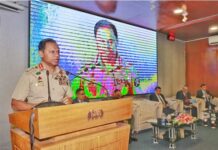
Photo: U.S. political scientist Francis Fukuyama (left) and DW’s Simon Young at the Berlin Wall Memorial. Source: SDYoung Twitter
Fukuyama Expects People to Still Mark 1989 in 100 Years
Deutsche Welle Interview
BERLIN (IDN-INPS) – “I think democracy has got a lot of strengths that may not be evident in the short run, but will play out over the longer run because the ability to change your leaders, ability to hold them accountable is really important,” American political scientist and writer Francis Fukuyama, author of the much debated 1989 “The End of History” article, told Germany’s international broadcaster Deutsche Welle (DW).
In an interview with DW’s Simon Young ahead of the 30th anniversary of the fall of the Berlin Wall on November 9, Fukuyama said: “I think that the kinds of checks and balances that exist in a true liberal democracy are pretty important guarantees that power is not going to be abused.”
Following are excerpts of the interview in a press release issued by DW:
Fukuyama: “In 100 years, people will still mark 1989 as a really important turning point where Europe reunited and the grip of communism really ended, including, two years later, that with the collapse of the Soviet Union itself. The problem is that it’s now been replaced by other systems that are also not very good liberal democracies. And so throughout Eastern Europe, a lot of the former communist countries in a way have been relapsing.”
“I don’t think that it’s possible to clearly divide the world into two camps in the way we did at the time of the Cold War,” the writer said, explaining that today “the world in a way is a lot more diverse and you’ve got authoritarian regimes. The Chinese have a model that’s very different. It blends a certain kind of state capitalism with a highly authoritarian, centralized dictatorship. And it’s been quite successful. It’s stable. It’s produced a lot of wealth. You have an Islamic model in the Middle East, which has been much less successful as a real alternative. And then you have these new illiberal democracies that claim to be democracies, but really don’t get all the checks and balances that a proper democracy needs.”
Community and National Identity Make a Lot of Sense
Fukuyama said he believed the rise of populism and nationalism was not only due to economic changes in a globalized world but that the problem “is a cultural one where the problem is really the loss of a sense of community and national identity in the face of massive levels of immigration, outsourcing of jobs. I think that makes people intensely uncomfortable because they actually want to be bound by identities that are stronger than what a liberal society can give them.”
Fukuyama: “One thing that gives me a little bit of hope is that the spirit of 1989 is still around in the world. You’ve seen in Istanbul and Budapest, you had votes that went against the dominant populist party. You saw it in Armenia, Sudan, Algeria. There are many places where people really don’t want to live under a dictatorship. So I think we have to bear in mind that this desire for life in a freer society still exists in many parts of the world.”
On Trump: ‘Let’s hope it’s a passing phase’
He said he was worried about the current U.S. administration walking away from long-term economic and military alliances. “Either that vacuum is going to be filled by other powers that are not democratic like Russia and China or it could simply become more chaotic.”
Fukuyama added: “Let’s hope it’s a passing phase. In the United States, the institutions are actually pretty strong. (…) [Trump] is certainly trying to do his best to weaken those checks and balances institutions. But in the end, the most powerful one is an election and we’re going to have an election in 2020. We’ll have to see how durable American democracy is.” [IDN-InDepthNews – 10 November 2019]
Photo: U.S. political scientist Francis Fukuyama (left) and DW’s Simon Young at the Berlin Wall Memorial. Source: SDYoung Twitter
IDN is flagship agency of the International Press Syndicate.









